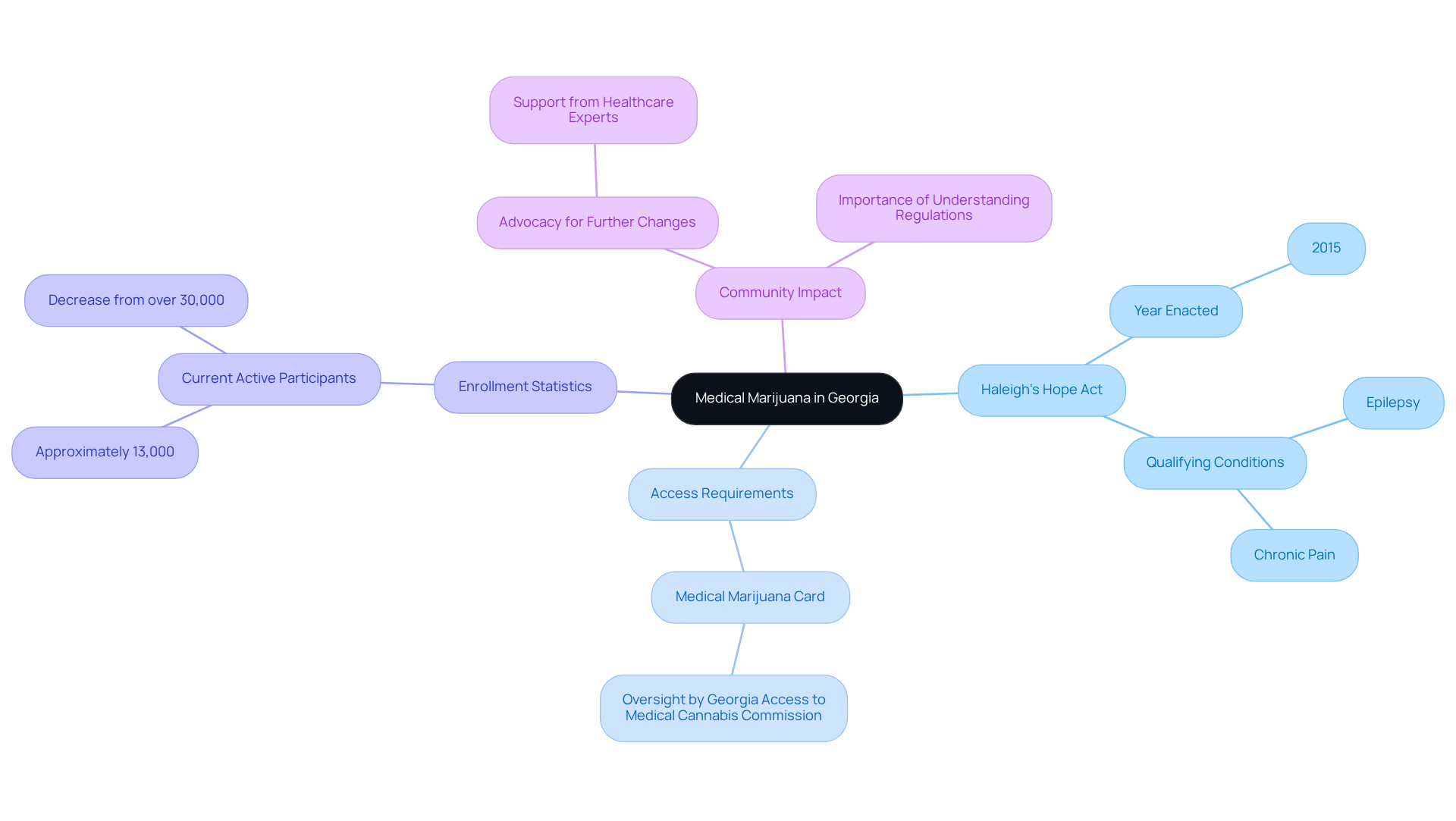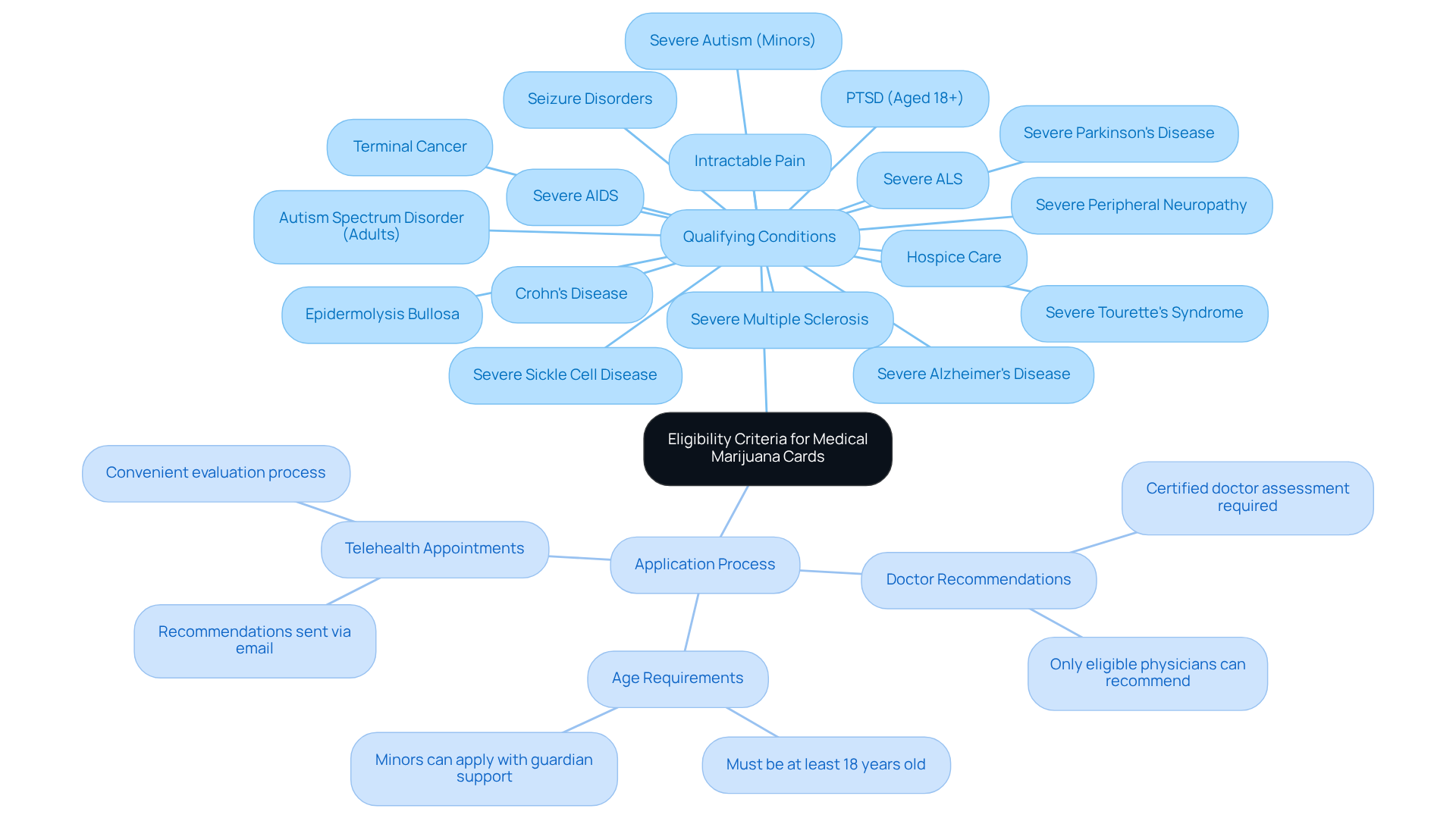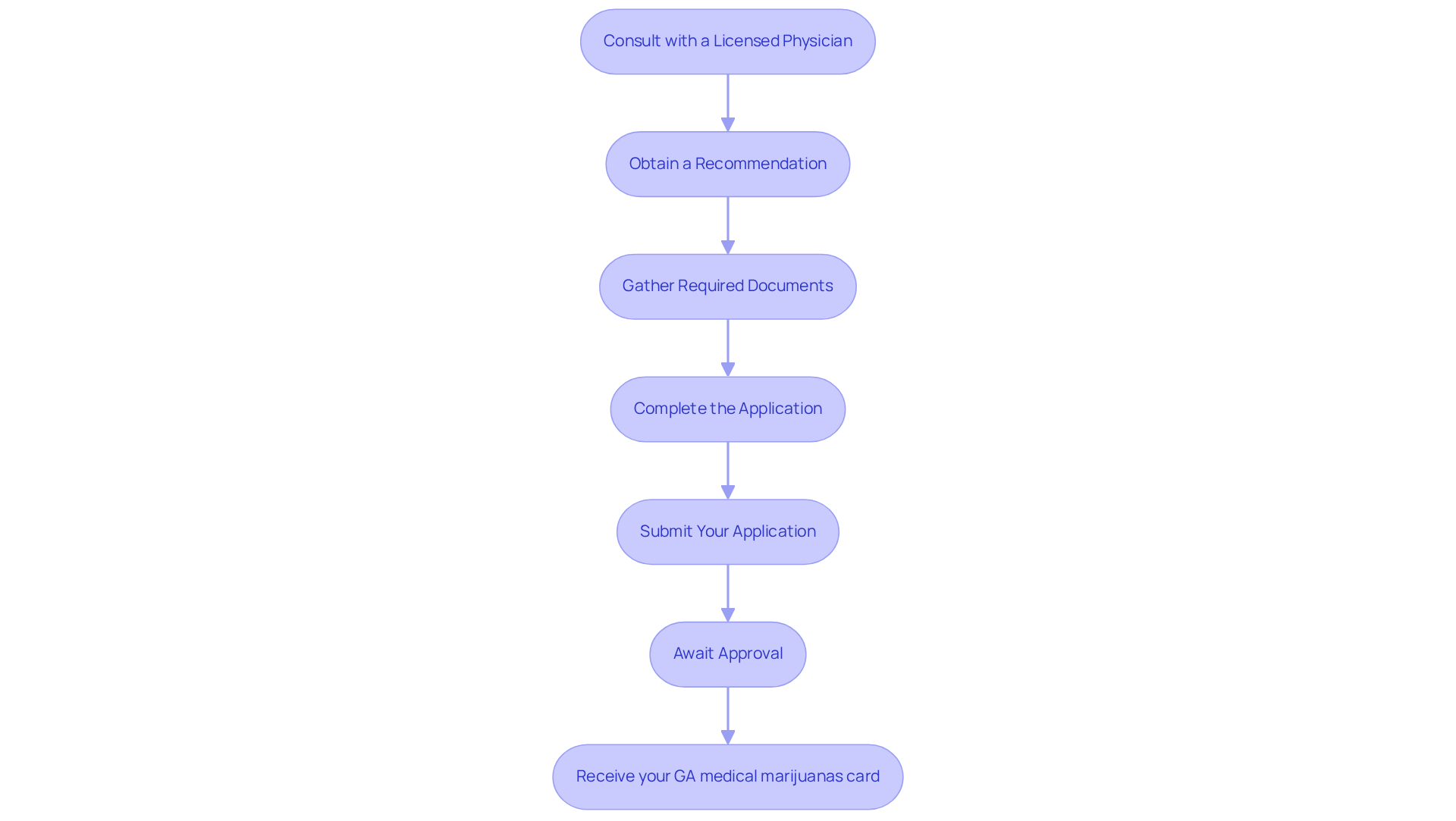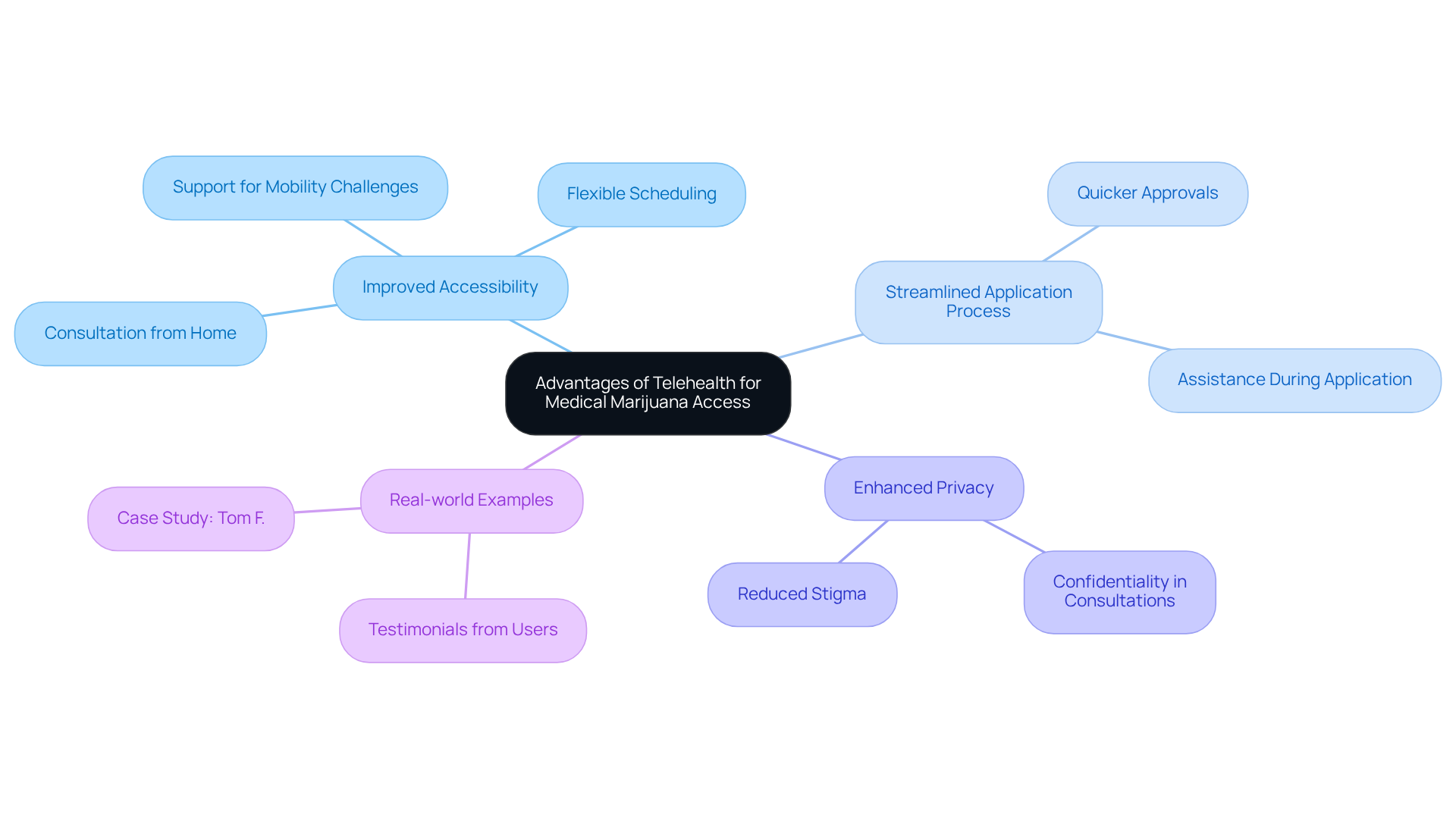Navigating GA Medical Marijuanas: Your Step-by-Step Guide
by Maya Green · September 5, 2025
Navigate the process of obtaining GA medical marijuanas with our comprehensive step-by-step guide.

Overview
Navigating Georgia’s medical marijuana landscape can feel overwhelming, especially when you are trying to secure a medical marijuana card. It’s essential to understand that this process requires a qualifying diagnosis, a physician’s recommendation, and adherence to state regulations. Acknowledging the complexity of these requirements is the first step towards finding relief.
You may find comfort in knowing that there are clear steps to follow for your application. Telehealth services play a pivotal role in this journey, significantly improving access to medical cannabis. These resources can facilitate timely care and support for individuals with qualifying conditions, making the process feel less daunting. Remember, you are not alone in this; many have walked this path and found the support they needed.
As you consider your options, take a moment to reflect on how these services can provide the assistance you seek. With the right guidance and resources, you can navigate this process with confidence. Embrace the opportunity to advocate for your health and well-being, knowing that compassionate help is available to you.
Introduction
Navigating the landscape of medical marijuana in Georgia can feel overwhelming, especially with the constantly changing regulations and eligibility criteria that dictate access. It’s important to acknowledge that many individuals are seeking relief, and with the state’s progressive steps—like the enactment of Haleigh’s Hope Act—more people are exploring the therapeutic benefits of cannabis for various medical conditions. However, you may be wondering: how can you effectively navigate the application process and ensure you meet the necessary requirements?
This guide is here to help demystify the complexities of obtaining a medical marijuana card in Georgia. Our goal is to empower you to access the relief you deserve. We will also highlight the advantages of modern telehealth solutions, making this journey smoother and more accessible for you.
Overview of Medical Marijuana in Georgia
Georgia’s journey toward therapeutic use began with the Haleigh’s Hope Act, enacted in 2015. This significant legislation allowed individuals with qualifying conditions to access low-THC hemp oil, marking a pivotal moment in care for those suffering from conditions like epilepsy and chronic pain. It’s heartening to see how, in 2019, the state further expanded its therapeutic cannabis program, enabling the cultivation and distribution of medicinal cannabis, thus broadening the range of available treatments.
To legally access GA medical marijuanas, individuals must obtain a medical marijuana card, a process overseen by the Georgia Access to Medical Cannabis Commission. This dedicated body ensures that the program complies with state laws and regulations, safeguarding the interests of those receiving care. Currently, approximately 13,000 active individuals are enrolled in Georgia’s low-THC oil program—a notable decrease from over 30,000. This statistic underscores the ongoing challenges in access and awareness that many face.
The impact of the Haleigh’s Hope Act has been profound. It has not only eased access to GA medical marijuanas but also fostered a community of supporters advocating for further changes. Healthcare experts emphasize the importance of this act in enhancing the quality of life for individuals, noting that it has opened doors to alternative therapies that were once out of reach. As the state navigates the complexities of cannabis regulations, it’s essential for individuals to understand the laws surrounding GA medical marijuanas to ensure they are using cannabis safely and lawfully.
You may find that understanding these regulations can empower you or your loved ones in utilizing cannabis effectively. It’s crucial to stay informed and connected with the community, as together we can advocate for continued improvements in access to these vital therapies.
Eligibility Criteria for Medical Marijuana Cards
Navigating the process of obtaining a GA medical marijuana card in Georgia can feel overwhelming, especially when considering the necessary eligibility criteria. To qualify, individuals must be diagnosed with a condition recognized by the state. As of 2025, this includes serious conditions such as:
- Terminal cancer
- Severe ALS
- Seizure disorders
- Crohn’s disease
- Severe multiple sclerosis
- Severe Parkinson’s disease
- Severe sickle cell disease
- Severe Tourette’s syndrome
- Autism spectrum disorder for adults
- Severe autism for minors
- Epidermolysis bullosa
- Severe Alzheimer’s disease
- Severe AIDS
- Severe peripheral neuropathy
- Those in hospice care
- Intractable pain
- PTSD for individuals aged 18 and older
It’s important to remember that other conditions like anxiety, arthritis, chronic pain, epilepsy, glaucoma, and migraines may also qualify in certain states.
If you’re considering applying, you must be at least 18 years old, though minors have the option to apply with support from a legal guardian. A certified doctor will need to assess your health history and current condition, providing a recommendation that validates your diagnosis. This step is crucial, as only eligible physicians can recommend low THC oil for the specified conditions. Understanding these criteria is essential for patients to ensure they meet the necessary requirements before applying. In fact, around 20% of individuals diagnosed with PTSD in Georgia are using cannabis as part of their treatment strategy, highlighting the importance of exploring your options.
Additionally, Leafy DOC offers a convenient telehealth appointment process for cannabis certification. You can schedule your evaluation from the comfort of your home, connecting with licensed physicians who will assess your qualifying conditions and send recommendations via email. Remember, only pharmacies with a specific dispensing license are authorized to sell low-THC oil in Georgia.
It’s worth noting that the list of qualifying conditions for GA medical marijuana has evolved over time, reflecting legislative changes aimed at expanding access to therapeutic marijuana. If you or someone you know might benefit from this, consider reaching out for more information and support on this journey.
Step-by-Step Guide to Applying for a Medical Marijuana Card
-
Consult with a Licensed Physician: Start your journey by scheduling an appointment with a physician registered in the GA medical marijuanas program. During this consultation, it’s important to discuss your health history and symptoms so that you can evaluate your eligibility for cannabis together.
-
Obtain a Recommendation: If your doctor believes you meet the necessary criteria, they will provide a written endorsement for cannabis. This endorsement is a vital step in your application process for GA medical marijuanas, ensuring you have the support you need.
-
Gather Required Documents: Take a moment to collect essential documents for your application. You’ll need proof of residency, a government-issued ID, and the physician’s recommendation. Having these documents ready will help streamline your application, making the process feel less overwhelming.
-
Complete the Application: Visit the Georgia Department of Public Health’s website to access the GA medical marijuanas card application. As you fill out the form, ensure that you do so accurately and completely. This attention to detail will help avoid any unnecessary delays.
-
Submit Your Application: Once you’ve completed the application, submit it along with the required documents and the application fee. This step is crucial for moving forward in the process, and your efforts will soon pay off.
-
Await Approval: After submission, the Department of Public Health will review your application. While approval times can vary, many applications are processed within 14 days. This efficient system is designed to assist individuals like you, making the wait a little easier.
-
Receive your GA medical marijuanas card: Upon approval, your therapeutic herb card will be sent to you, granting you access to acquire therapeutic products from authorized dispensaries throughout Georgia.
As of 2024, the number of active therapeutic cannabis users in Georgia has surpassed 26,000. This statistic highlights the growing acceptance and use of medicinal herb in the state. Understanding the application process is essential, as it can provide significant benefits for individuals with qualifying conditions. Remember, you are not alone on this journey, and taking these steps can lead to a more fulfilling path.
Advantages of Telehealth for Medical Marijuana Access
Telehealth offers considerable benefits for individuals seeking access to GA medical marijuanas, especially for those facing mobility challenges or residing in remote areas. By removing the need for in-person visits, telehealth enables individuals to consult licensed physicians from the comfort of their homes, significantly enhancing accessibility. Flexible scheduling options for telehealth appointments cater to busy lifestyles, making it easier to receive timely care.
The online application process for cannabis cards at Leafy DOC is notably streamlined, resulting in quicker approvals and faster access to essential medications. This efficiency is vital for individuals with chronic pain who need immediate relief. Additionally, Leafy DOC prioritizes individual privacy and confidentiality, which is crucial for those seeking therapeutic herb treatment.
Real-world examples highlight how telehealth can improve access to medical cannabis. For instance, individuals like Tom F., who live in rural areas, have shared positive experiences with Leafy DOC’s telehealth services, allowing them to connect with healthcare providers without the stress of travel. Moreover, Leafy DOC offers comprehensive support during the application process, ensuring individuals have the assistance they need. Testimonials from satisfied clients underscore the compassionate and efficient nature of Leafy DOC’s services, emphasizing that the process is quick and accessible, even for those with disabilities.
As telehealth continues to evolve, its role in facilitating access to GA medical marijuanas for patients is becoming increasingly important, especially for individuals who may face barriers to treatment. Furthermore, obtaining a GA medical marijuanas card provides legal protection, access to quality products, and medical supervision, which significantly enhances the overall patient experience. It’s important to remember that you are not alone in this journey; support is available to help you navigate your options and find the relief you deserve.
Conclusion
Navigating the landscape of medical marijuana in Georgia is a journey that empowers individuals to access essential therapeutic options. Since the introduction of the Haleigh’s Hope Act, laws have evolved, creating pathways for those with qualifying conditions to seek relief through low-THC cannabis. It’s important to understand the intricacies of obtaining a medical marijuana card, as this not only facilitates access to treatment but also ensures compliance with state regulations.
Throughout this discussion, we’ve highlighted key points, including:
- The eligibility criteria for medical marijuana cards
- The detailed step-by-step application process
- The significant advantages of utilizing telehealth services
These insights emphasize the importance of being informed and prepared, as approximately 26,000 individuals in Georgia are already benefiting from the therapeutic use of cannabis. The streamlined application process and the support offered by telehealth services, such as those provided by Leafy DOC, further enhance accessibility for patients, especially those facing mobility challenges or residing in remote areas.
Ultimately, understanding and engaging with Georgia’s medical marijuana system is crucial. By advocating for yourself and staying informed, you can navigate the complexities of this evolving landscape and access the relief you deserve. As our community continues to grow and evolve, it is vital to support ongoing efforts for improved access and awareness. Together, we can ensure that all those in need can find the therapeutic benefits of medical marijuana in Georgia.
Frequently Asked Questions
What is the Haleigh’s Hope Act and when was it enacted in Georgia?
The Haleigh’s Hope Act is legislation enacted in 2015 that allowed individuals with qualifying conditions to access low-THC hemp oil in Georgia, marking a significant step in therapeutic care.
What developments occurred in Georgia’s medical marijuana program in 2019?
In 2019, Georgia expanded its therapeutic cannabis program to enable the cultivation and distribution of medicinal cannabis, thereby broadening the range of available treatments.
How can individuals legally access medical marijuana in Georgia?
Individuals must obtain a medical marijuana card, which is overseen by the Georgia Access to Medical Cannabis Commission, ensuring compliance with state laws and regulations.
How many individuals are currently enrolled in Georgia’s low-THC oil program?
Approximately 13,000 active individuals are enrolled in Georgia’s low-THC oil program, which is a decrease from over 30,000 previously.
What impact has the Haleigh’s Hope Act had on the community and healthcare?
The Haleigh’s Hope Act has eased access to medical marijuana, fostered a supportive community advocating for further changes, and enhanced the quality of life for individuals, allowing access to alternative therapies.
Why is it important for individuals to understand the laws surrounding medical marijuana in Georgia?
Understanding these regulations is crucial for individuals to ensure they are using cannabis safely and lawfully, as well as empowering them to advocate for continued improvements in access to vital therapies.
Last Updated: September 4, 2025
Get Approved for Your Medical Marijuana Card in Minutes!

Get Your Medical Card
Connect with a licensed physician online in minutes

Like This Article?
Share with your friends
Table of Contents
Keep Reading
-
5 Steps to Obtain Your South Carolina Medical Marijuanas Card
Learn how to obtain your South Carolina medical marijuanas card in five simple steps.
-
4 Steps to Get Your RI Medical Marijuanas Card Online
Easily apply for your RI medical marijuanas card online with our step-by-step guide.
-
Using Medical Cannabis For Effective Pain Management
Find out how medical cannabis can effectively manage pain and improve your quality of life. Learn about its benefits and determine if it’s the right solution for you. Click now to discover the power of medical cannabis for pain management!







